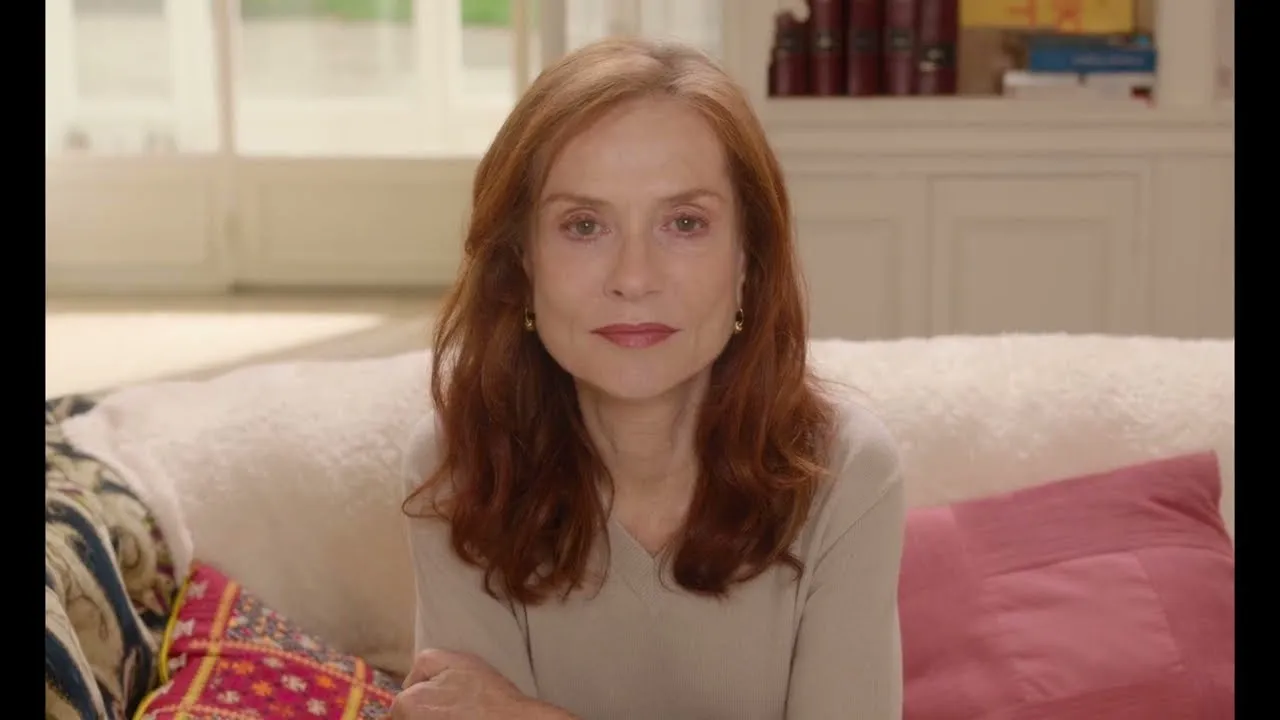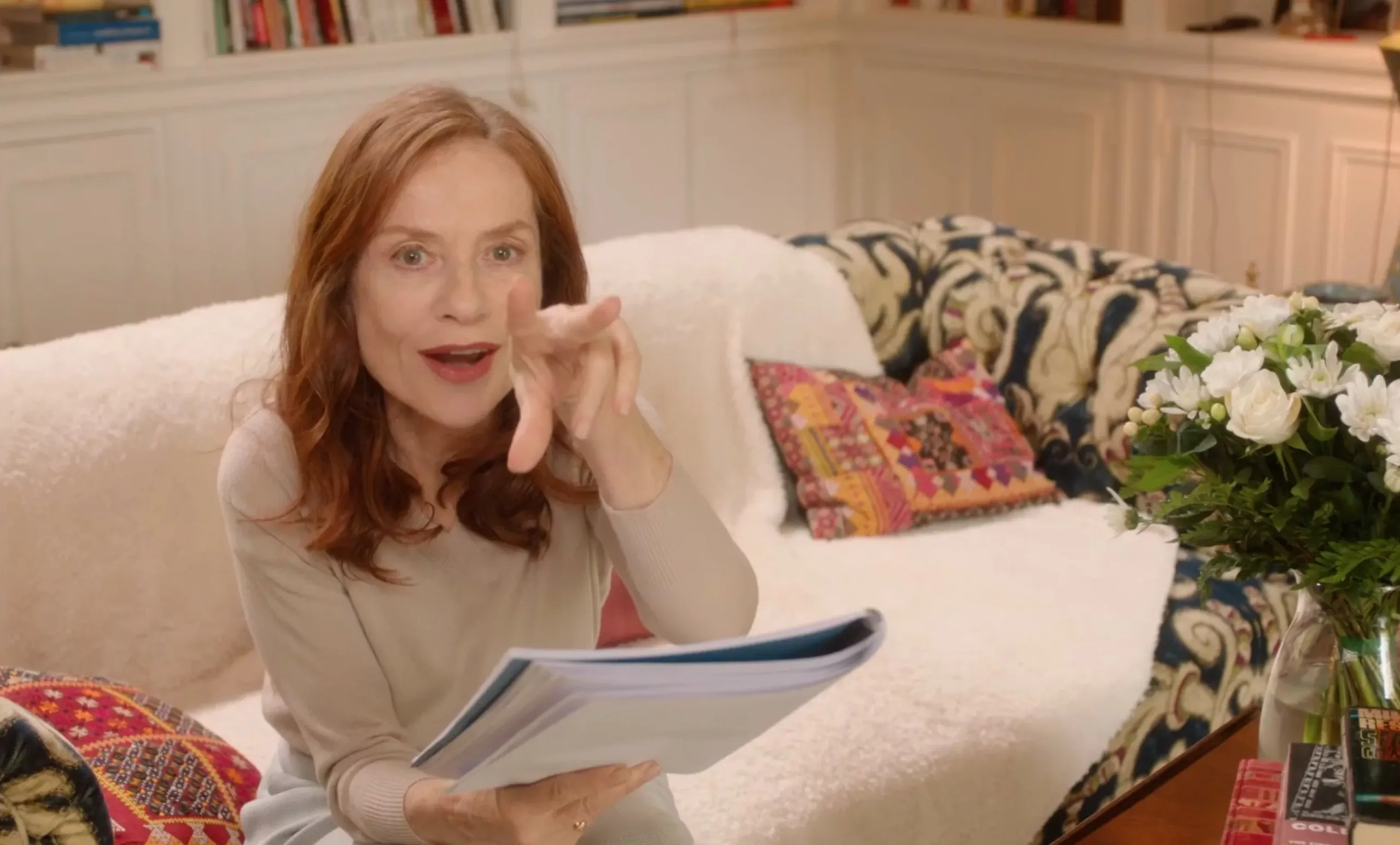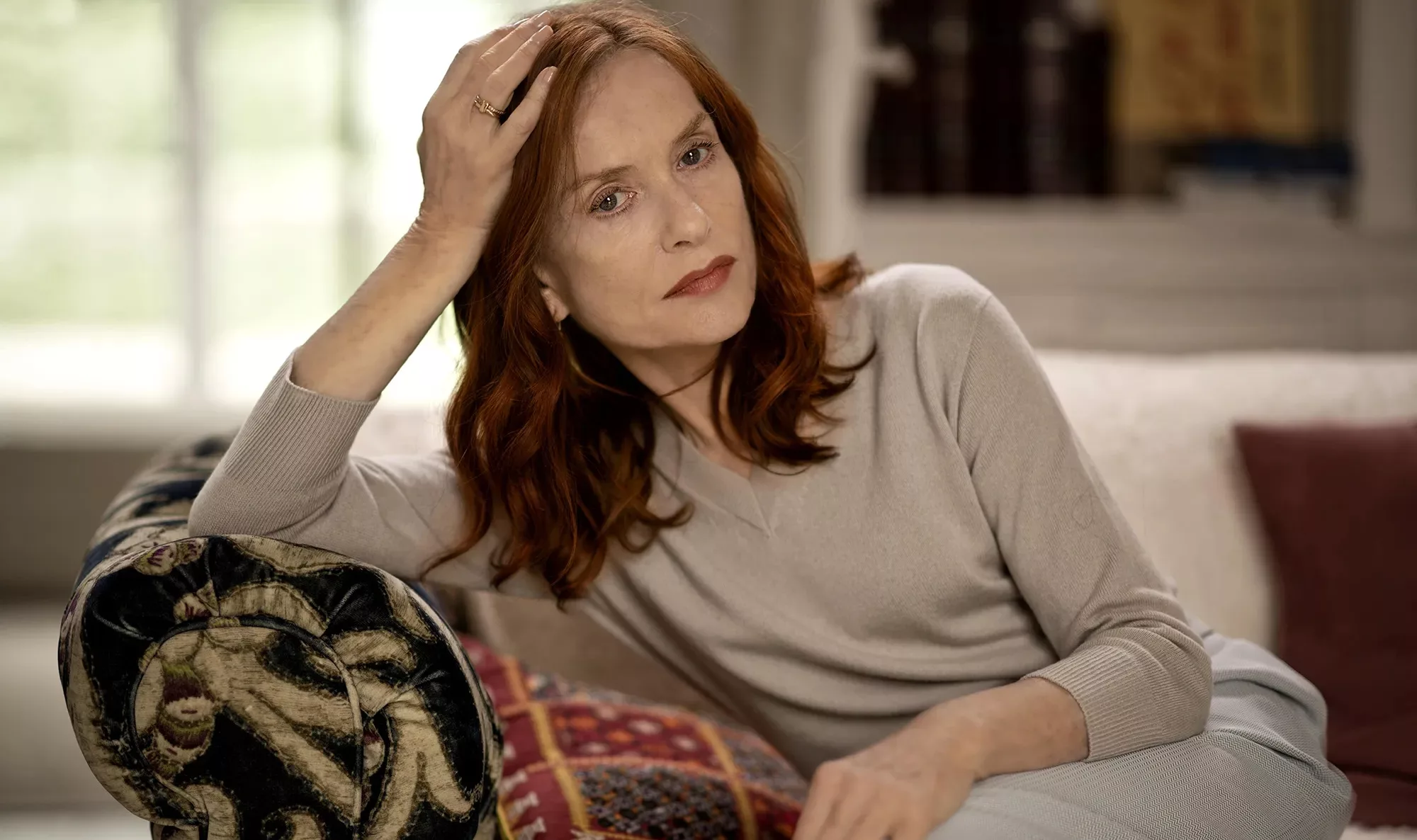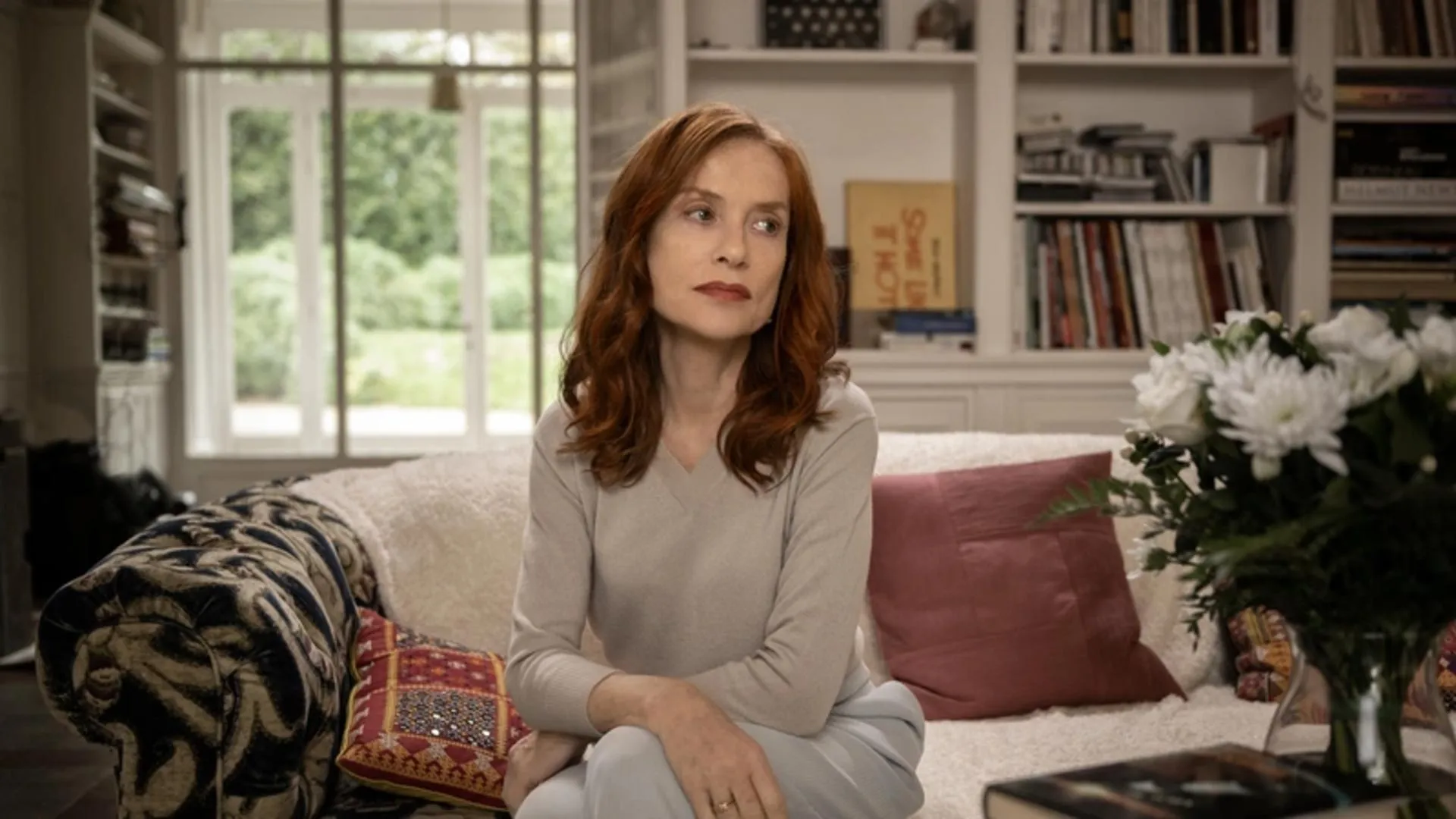For its entirety, Marianne consists of a single uninterrupted take filmed in close-up on the French powerhouse Isabelle Huppert. She sits facing the camera on a plain sofa and engages in a direct dialogue. With script in hand, Huppert delivers a rambling interior monologue that touches on life, art, and the essence of the cinematic experience itself.
Shown out of competition at the 41st Turin Film Festival, director Michael Rozek’s experimental film locks this versatile actress into an intentionally constrained performance that divided critics but remains undeniably thought-provoking.
Huppert has few peers in her ability to captivate an audience with her presence alone. For 90 minutes, the viewer is transfixed by her ever-shifting expressions and the gleam in her eye as she addresses us directly. At times playful, pensive, or defiantly challenging our patience, Huppert draws us into her private reflections through the intimate setting. References are made to the classics of Bergman, Tarkovsky, and Duras, but Marianne finds its own singular tone as a stripped-back consideration of performance, reality, and the communicative potential of film.
Minimalism taken to its logical limit, Marianne brings to mind the directness of the earliest moving images while blending in postmodern nods to its constructed nature. With its unbroken form and a movie star seemingly conversing extemporaneously, Rozek’s film left critics and festival audiences divided in their readings of its success and message.
As a daring experiment that stretches the boundaries of what a cinematic narrative can achieve, Marianne remains an unforgettably provocative viewing experience for those open to sharing in Huppert’s revelatory inner dialogue.
The Stripped-Back Stage of Marianne
Cinediegetically, Marianne presents a stripped-back stage for its leading lady. For the full 90 minutes of runtime, Isabelle Huppert sits alone on a plain couch, facing forward in medium shot. Under director Michael Rozek’s constraints, one of cinema’s most expressive actresses is confined to this static frame. However, it’s through these stark limitations that the true artistry of Huppert’s performance emerges.
Her intermittent glances down at the script in hand acknowledge the constructed nature of the setup. But Huppert fully commits to her direct monologue, questioning the watching “audience” and defiantly testing our dwindling patience. At times the repetition and meditative pacing might frustrate, yet it also draws us deeper under her spell. Punctuated by piercing stares into the camera, Huppert’s musings assume a confessional tone that compellingly blurs reality and fiction.
Parallels can be seen to chamber plays, where the theatrical scope is reduced to a singular orator’s intimate dialogue. And like unconventional performance art, Marianne focuses all attention on its magnetic leading figure. Both in form and theme, Huppert’s immobilized location on the couch mirrors her character’s inward state of introspection and confinement within bare expressions. By radical experimentation, director Rozek captures his star’s nuanced abilities in a thought-provoking showcase of pure cinema.
Isabelle Huppert’s Revelatory Internal Dialogue
For the entire 90-minute runtime, Isabelle Huppert holds our complete capture. Working within the constraints of the static shot, she portrays a mesmerizing array of emotions through the subtlest gestures and glimpses in her eyes. We sense uncertainty, frustration, but also deep empathy—all conveyed with the nuance we’ve come to expect from one of cinema’s foremost actresses.
The film references realities explored by Tarkovsky and Duras, mirroring those works’ examinations. Huppert’s character directly addresses existential themes, blurring the lines between internal thoughts and external revelations. At times playful, others more pensive, her musings ponder narrative and our relationship with performers.
This metacommentary highlights Huppert’s command of her craft. With apparent sophistication but also thoughtful vulnerability, she intellectually provokes and guides our reflections. Freed from a predefined role, Huppert boldly brings her singular presence to contemplate boundaries—between fiction and lived experience, between self and other. Through bare intimacy, she invites us to share in her character’s revelatory internal dialogue.
Huppert’s Rumination on the Cinema’s Communion
Marianne finds Huppert’s character lost in contemplation on the nature of her craft. She discusses the blurring lines between script and spontaneity in performance. Her desire, it seems, is to break down divisions—between actor and audience, fiction and reality.
This extends to her rejection of the conventional third-person role, preferring instead an intimate dialogue. Through it, the film meditates on cinema’s power to foster connection. References are made to the reflective works of Bergman and Tarkovsky, but Marianne brings such considerations to a singular extreme.
By maintaining the single continuous shot, Rozek encourages examination of the medium on its most essential experiential level. What begins the communication between film and viewer? For ninety minutes, we are transfixed by Huppert’s probing introspection on these questions, from the boundaries and capabilities of her art form.
Her musings hint at much—from the constructed nature of performance to narrative cinema’s constraints. Overall, Marianne sparks reflection on the communion that celluloid enables and the capacity for cinema to dissolve barriers between individuals through its basic ability to share vision.
Marianne’s Festival Debut and Legacy
Upon premiering at the renowned but uncompetitive Turin Film Festival, Marianne encountered differing reactions from critics. Some praised Rozek’s formal daring for its unbroken shot and confinement of Huppert. Others found its intentional minimalism pretentious or indulgent.
With its demands of patience and open engagement, the film was always likely to divide audiences based on their tolerance for experimental cinematic language. Huppert’s immense star power and ability to entrance for ninety minutes straight were arguably crucial in carrying less amenable viewers through to its end.
While not universally embraced at first, it’s clear Marianne seeks a particular kind of spectator open to thoughtful contemplation of its piercing themes and sheer achievement in restrictive storytelling. For those receptive to its meditative invitations, the work has undoubtedly left a lasting impact.
In the years since its debut, Marianne seems destined for cult classic status. Finding new admirers among underground cinephiles willing to meet it on its own unusual terms, its influence is evident in other daring indies pushing formal boundaries. Where receptive audiences emerge to appreciate Marianne’s singular fusion of star charisma and intellectual provocation, its legacy will continue to resonate.
Marianne’s Legacy of Cinematic Provocation
While divisive upon release, Marianne’s influence on independent filmmaking is plain to see. Stripped-back works by Linklater and other experimental auteurs show Rozek’s impact. Even established names like Godard have ventured into similar constrained forms.
The film’s intimate character reflects Duras and shares her spirit of revitalizing chamber-style plays. By breaking conventions and challenging preconceptions of storytelling, Marianne proved some risk-taking is needed to push the art form ahead.
As more adventurous viewers embrace its demanding yet rewarding single-take format, cult classic status surely awaits. For appreciating its subtle achievements and probing of the film’s deepest themes, the work deserves reassessment.
As cinephiles are more open to provocative questions than easy answers, Marianne’s cult may grow. Its fearless formal daring and distillation of performance down to purist elements left an indelible mark. Some legacies are easiest perceived when we look back, guided by artists brave enough to point the way forward.
Marianne’s Enduring Challenge to Viewers
In conclusion, Marianne emerges as a bold cinematic achievement held aloft by Isabelle Huppert’s tour de force performance. Through its single stationary take stretching 90 minutes, Rozek’s film aggressively pushes viewers beyond their thresholds.
By breaking the fourth wall and forcing a one-sided “conversation,” Huppert compels us to reflect on performance, reality, and the capacity for film to foster understanding between individuals. References are made to masters like Bergman as she explores communion through the lens.
Divisive upon release, appreciation for Marianne’s uncompromising formal daring and thematic depth may grow in years to come. As a title that prioritizes ideas over easy entertainment, it rewards audiences open to intellectual challenge.
While never meant for passive spectating, Marianne offers rewards for those investing patience and presence of mind. Its place as a work boldly reimagining cinema’s potentials seems assured. Ultimately, it remains an acquired taste, but one richly deserving of cinephiles’ attentiveness.
The Review
Marianne
Through its radical formal constraints and Isabelle Huppert's transfixing lead performance, Marianne emerges as a work of cinematic provocation that demands contemplation. While not for those seeking casual viewing, director Michael Rozek's film serves its purpose in sparking discussion on performance, communication, and the reflective abilities of the medium. It remains an arthouse title that may divide audiences but deserves appreciation for its experimental successes.
PROS
- Isabelle Huppert delivers a towering and hypnotic lead performance.
- Ambitious formal experimentation through its single-take format
- Provokes thoughtful reflection on performance, communication, and filmic language
- Succeeds in stimulating discussion and challenging audiences' expectations
- Serves as a work of cinematic provocation that ushers in ongoing reevaluation.
CONS
- Willfully irritating and not intended for casual/passive viewing
- Uncompromising runtime may test the patience of some viewers.
- Dense themes and structure require open-minded engagement.
- Intrinsically divisive film that risks being misunderstood or overlooked
- Not meant as light entertainment but rather demanding artful meditation





















































